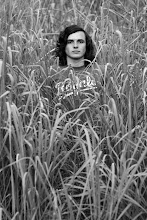
Tunisia was most everything I wasn’t expecting. However, in all actuality, I’ve come to the conclusion that this is a good thing. Going to the country in a small group of five others and myself, in addition to going on short notice, we didn’t have a very clear idea of what to expect, but we envisioned, remote, exotic, and certainly removed from large packs of tourists (the latter proved to be the most difficult criteria to fulfill). Though much of what transpired was contrary to our thoughts of what we thought we would be doing in Tunisia, God exposed us to much that, though not a part of our vision, was very much included in His. This was challenging in that it wasn’t taking-a-lot-of-pictures or finding-remote-villages; but God revealed to us what, though slightly less noticeable, was significantly more profound.



 (Nabil: Makes a killer mint tea)
(Nabil: Makes a killer mint tea)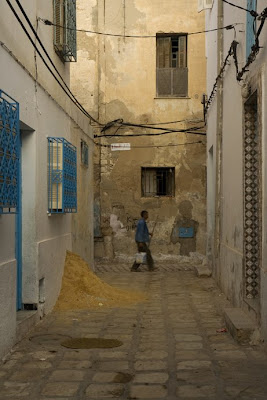
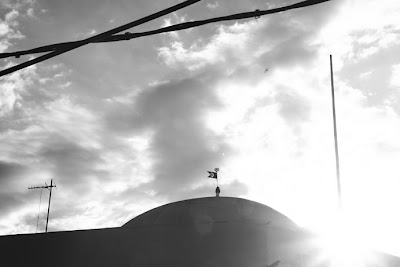
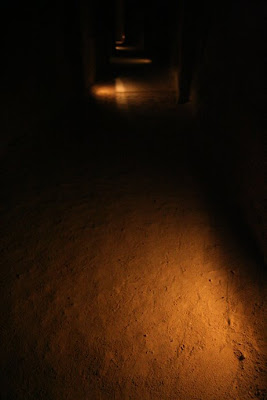 (pathway in the catacombs)
(pathway in the catacombs)Going to Tunisia, I was very unaware as to just how much early church history that the area contained. Much of Tunisia is in fact built above the ancient catacombs, where members of the early church would live and function underground to avoid persecution. We were told that nowadays it is not uncommon for areas of ground to simply fall through after rain, revealing new underground passageways where the literal underground church would have existed. The early church existed in this area during a time where Christians were being persecuted harshly, but when the church was growing rapidly. As we were underground in some of the catacombs, our contact walked us through some of the stories of the people who gave their lives in commitment to everything that Christ had called them to. What stood out to me was that when confronted with opportunities to compromise in their faith, even in the smallest of areas, even when it would have saved their lives or allowed them to continue caring for their families, these believers remained completely devoted to everything that Christ had called them to be. Because they had known Christ for who He really was, they were in no position to live in any other way than what He had called them to. This made me think. Am I, as Christ’s beloved, completely wedded to his causes and purposes for my life? After experiencing the catacombs, I desire to come to the place where I can respond in the affirmative.

It was once said that the blood of the martyrs is the seed of the church. Many of the remains of the early Christian martyrs still exist buried in the catacombs to this day. It could be said then, that Tunisia, is built on seeds for the church. Though many seeds exist in the soil, there are few farmers working in such a land.
While in Tunisia, it was a blessing to meet some of the workers that are cultivating the soil, so to speak. Seeing significance in numbers, they spoke of 2007 as the year of completion, and in turn, they now see 2008 as the year of new beginnings for God’s work in the country. It became apparent that God is indeed beginning a new work, even in such a seemingly dry place. Workers have been coming to Tunisia since the early 1900’s, but until recently, “Christianity” was not something that a majority of the population could connect with. It had yet to be something truly relevant, and even to this day, only about 15% of the population feels any connection with a traditional sense of the Christian faith. Christianity is still seen as something very western; and more than a relationship with God it is associated with much of the debauchery and scandalous activities that so often take place in our culture and are portrayed to the people of Islamic cultures through our music, movies, and other media.
 (The edge of the Sahara Desert near Douz)
(The edge of the Sahara Desert near Douz) (Fadel: tour group operator)
(Fadel: tour group operator)
 (Mohammed: "My heart is in the desert.")
(Mohammed: "My heart is in the desert.") (Mohammed and his mother: Their family are originally Nomads in the Sahara, but have become more settled in the last couple of years.)
(Mohammed and his mother: Their family are originally Nomads in the Sahara, but have become more settled in the last couple of years.)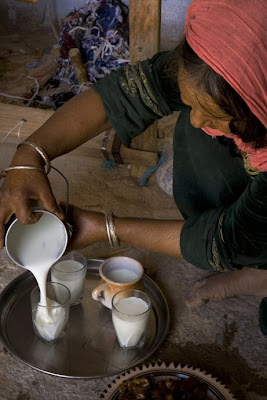 (Fermented Milk: Best consumed extremely quickly)
(Fermented Milk: Best consumed extremely quickly)

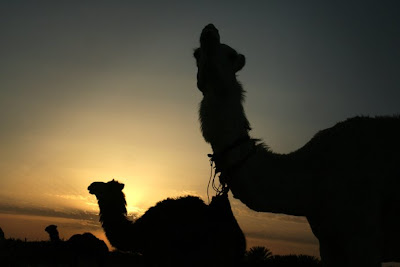
 (One portion of our trip was made alongside a group of Polish tourists. They didn't speak English. We didn't speak Polish.)
(One portion of our trip was made alongside a group of Polish tourists. They didn't speak English. We didn't speak Polish.)The work in Tunisia is moving in a new direction. We were reminded that Jesus wasn’t preaching Christianity; rather, He was preaching the Kingdom of God, which is something He wanted all peoples to be incorporated into. With such a new approach, we are no longer seeking to win people to Christianity, we are seeking to draw people into a realization of their place in God’s family. With this comes a lot of un-learning of what we always thought was necessary for a Christian faith. With the work in Tunisia, workers have found that the simple things are the things that have life. They spoke of how history shows that revival has flown much more quickly in open surroundings, outside of traditional church buildings. Revival did not take place in passive congregations under single pastors; rather, revival occurred where entire congregations as a whole were seeking to live as Christ Himself lived. No longer do we need a formal church building complete with steeple and cross. No longer do we need a bulletin with a schedule of the next week’s events. No longer do we need five worship songs (3 slow, 2 upbeat) followed by a 35-minute sermon (no more, no less). Church can take place in these settings, but it can just as well take place wherever people meet for fellowship, prayer, worship and communion – which could take place in an abandoned warehouse or a comfortable living room complete with matching sofa sets.
 It was encouraging to be around people whose minds were so completely geared for the long term. With traveling around over the last many months, we’ve just been getting short glimpses of what God is doing in many different parts of the world. With this program, we are spending short amounts of time in these areas, but in using our photography to expose God’s heart, I am reminded that our goal is in fact to bring about a lasting, long-term change towards the heart of God for each of these areas. In focusing on the long-term, the necessity of commitment to the people, places, and issues involved becomes quite apparent. It’s not something that I need to remember one year, and forget the next; instead, it is toiling when it’s easy, and toiling when it’s difficult, to see a people come to a knowledge of the life (beyond this one) that is revealed to us through Christ Jesus our Lord. Our worker friend told us, “There’s an anointing that goes with the commitment.”
It was encouraging to be around people whose minds were so completely geared for the long term. With traveling around over the last many months, we’ve just been getting short glimpses of what God is doing in many different parts of the world. With this program, we are spending short amounts of time in these areas, but in using our photography to expose God’s heart, I am reminded that our goal is in fact to bring about a lasting, long-term change towards the heart of God for each of these areas. In focusing on the long-term, the necessity of commitment to the people, places, and issues involved becomes quite apparent. It’s not something that I need to remember one year, and forget the next; instead, it is toiling when it’s easy, and toiling when it’s difficult, to see a people come to a knowledge of the life (beyond this one) that is revealed to us through Christ Jesus our Lord. Our worker friend told us, “There’s an anointing that goes with the commitment.”This trip surely challenged me. It challenged me in learning to find what God is doing beyond what I think he should be doing. There is a lot more hope and potential than would automatically seem to be apparent; it just looks different than we would expect. I surely don’t feel like I came away with any pictures that blew my mind, but I do feel as though God accomplished something in my heart, and he taught me so much more about what He is doing, and wanting to do, in our world – in an Islamic context and beyond.
 (They're scanning. They're searching.)
(They're scanning. They're searching.)Ways you can pray for Tunisia/North Africa:
-Empowerment for the committed workers. In a dry land with overwhelming odds, they need vision, knowledge, wisdom, encouragement, and more.
-That God would bring about influential relationships in the communities for the workers in these areas.
-That the relevance of the gospel would be evident in an Islamic context.
-Leadership in churches – expressed in all members.
-Empowerment for the committed workers. In a dry land with overwhelming odds, they need vision, knowledge, wisdom, encouragement, and more.
-That God would bring about influential relationships in the communities for the workers in these areas.
-That the relevance of the gospel would be evident in an Islamic context.
-Leadership in churches – expressed in all members.


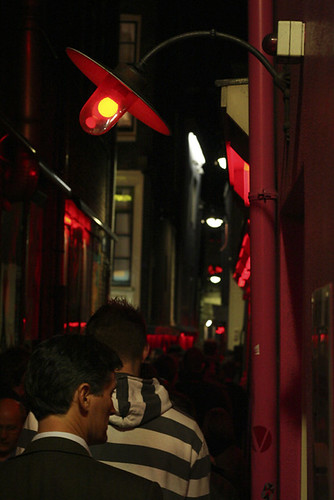 To buy "Sex + Money: A Global Search For Human Worth," please click below. The $20 cost includes the book, and shipping to your current location (within the U.S.).
PayPal is a safe and secure online payment method. Visit
To buy "Sex + Money: A Global Search For Human Worth," please click below. The $20 cost includes the book, and shipping to your current location (within the U.S.).
PayPal is a safe and secure online payment method. Visit 